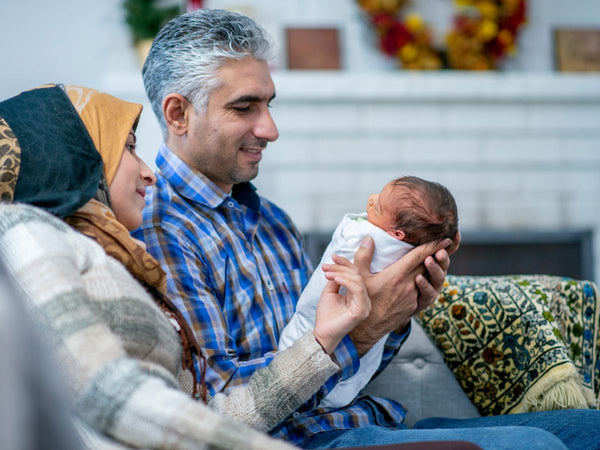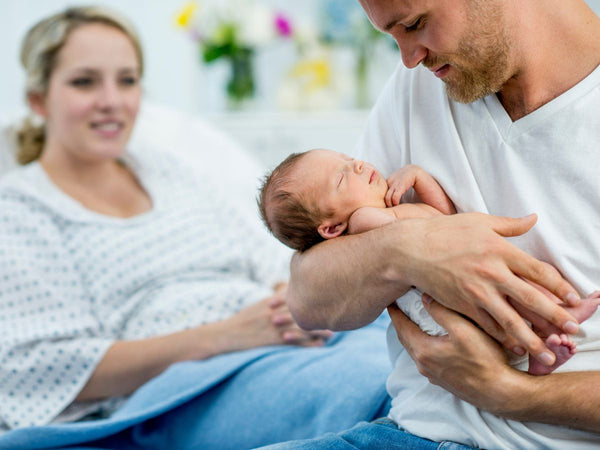Key points
- When you’re pregnant, plan for how you’ll manage visitors after your baby’s birth.
- Decide what’s right for you, your partner and your baby when it comes to visitors.
- Tell people gently what days and time suit you best for visits.
- If people offer to help, be specific about what you want and need.
Hello Baby!
One of life’s joys is to introduce a new baby into our family and social networks. Most people love to share the excitement of meeting the newest little person and want to be part of the experience. It can help though to have some ideas and a plan on how to manage visitors in a kind and sensitive way.
Remember, most adults are reasonable and if needed, respond to gentle cues around the best time to visit and to leave.
Visitors
Some new parents find the idea of visitors a welcome distraction from their day. Others find the concept more than a little overwhelming. Wherever you sit on the spectrum of enjoying the company of others, you can be forgiven for becoming a little less social after having your baby.

1. Chat with your partner during your pregnancy
Being clear with each other about how you’re going to manage visitors can help to avoid feeling overwhelmed later. It’s reasonable for your partner to have any of ‘the hard conversations’ with others around letting you and your baby having time first to get to know each other.
Physical and emotional recovery after birth can take some weeks and if you’ve had a long and difficult labour and birth, perhaps even longer. There is no perfect time when visitors may be welcome.
Don’t assume your partner has the same expectations about visitors as you do. If they’re used to a very social family and you’re more reserved, what you each consider to be normal may be very different.
If you’re anxious about being overwhelmed with visitors when your baby is born, consider not telling people your exact due date. Another option is to share a date which is later than your exact due date.
Check the maternity hospitals visiting times during your pregnancy and let your friends and family know these before you have your baby. If you’d prefer people didn’t come to visit, tell them during your pregnancy.
2. Speak with your nearest and dearest before your baby is born
Have some honest chats about what you’d like to happen in terms of visiting. There is no ‘one size fits all’ approach to visitors in the newborn period. This is one of the times in your life when you’re allowed to be a little self-centred. Be clear and specific so there’s no confusion about what you mean.
If you’d prefer no visitors in hospital, let people know. And ask the staff to put a sign on your door and advise people that you’re resting. Tell your friends and family that you’re really excited about them meeting the new baby and you or your partner will be in contact as soon as possible to arrange a day and time for visits.
3. Ask your partner to manage visitors
Speak openly with your partner about the possibility of them needing to be the gatekeeper for visitors. Ask that they check with you first to see you’re not sleeping or just want some time as a family. It’s also fine to be selective about who you want to visit you. Calm, quick visits to say hello are easier to manage than visits which last hours.

4. Send out texts suggesting days and times when people are welcome
Send out group texts and let people know it may be a while before you get back to them because you’re a little preoccupied. If you’ve got the time and the inclination, send updates and photos on how you and your baby are going.
It may be easier for you to have group visits, rather than a constant stream of people. Ask your friends and family if they can coordinate a day and time which suits you all.
5. Prioritise you and your baby first
If you’re more of a people pleaser, you could find it difficult to put yourself first. But becoming a parent requires a whole range of new skill building - prioritising your own needs and your baby’s is one of many.
Saying no to people may be difficult the first few times you do it. But because you need to make sure you and your baby come first; you’ll be motivated to make the best decisions.
It can take up to six weeks or longer to recover from labour and birth. It’s important in this time to rest and focus on getting to know your baby. Building confidence and skills with breastfeeding, changing, settling and getting to know your baby’s cues will take many hours. This is best done in the comfort of your own home and where you can fully relax.
6. Practice asking potentially difficult questions
Let people come to you if that’s more manageable. However, if you know people who are likely to overstay their welcome, it may be better for you to go to them. Plan for timed visits at your convenience. When making plans, let your hosts know how long you’re likely to be able to stay.
7. Ask people to stay away if they’re unwell
It’s entirely reasonable to ask that only healthy people visit. You will need to be the advocate for your baby and ensure their health is not compromised. Your baby’s immune system is still developing and they will be vulnerable until they are more mature.
Ask people not to visit if:
- They’re sick.
- They have cold sores.
- They’ve not been vaccinated for Covid and Whooping Cough.
- They’re not agreeable to wearing a mask when they’re near you and your baby.
- They’re not prepared to wash their hands before handling your baby.

8. Be flexible and prepared to change your plans
You may plan to pretty much isolate yourself after your baby is born, but could find you’re keen to catch up with people. Alternately, you may think you’ll be up to seeing people and for all sorts of reasons, prefer to just hunker down with your baby.
The early days and weeks after having a baby are precious. Be patient and kind to yourself as you find your way through the new baby haze.
9. Remember, you don’t need to entertain people
Don’t feel you need to cater to visitors by preparing food and drinks. Wait until they offer and say yes to any reasonable offers of support. If people ask you how they can help, make some suggestions. Folding washing, meal preparation, caring for older children, the list is endless.
10. Ration your time for visitors
Prioritise yourself and your baby each day. There will be times when you don’t want to see anyone and just sit in your pyjamas eating cereal on the couch. That’s fine!
Be kind to yourself and others when you quarantine days and even weeks to just settle in and learn what’s involved in managing your own little family. After birth, the special, early window of time passes by so quickly so make the most of it.
About the Author:
Written for Nourish Baby by Jane Barry. Jane has qualifications in general, paediatric, immunisation, midwifery and child health nursing. She holds a Bachelor Degree in Applied Science (Nursing) and has almost 35 years specialist experience in child health nursing. She is a member of a number of professionally affiliated organisations including AHPRA, The Australasian Medical Writer’s Association and Australian College of Children and Young People’s Nurses.
References
About Nourish Baby | Online Antenatal Classes & Parenting Courses
Australian Government Department of Health and Aged Care
Out-of-town guests & visitors after birth - COPE
Setting the rules for visitors when you have a newborn baby - ABC Everyday
Our Products
-

01. Guide to a Healthy Pregnancy
$55 -

02. Positive Birthing Course
$55 -

03. Infant Feeding Guide
$55 -

04. Baby Sleep Guide - First 12 Months
$55 -

05. Toddler Parenting Course 1 - 3 Years
$55
-
 When to Start Antenatal Classes?
When to Start Antenatal Classes?
Becoming a parent is an incredible milestone, but it comes with a host of changes that can be daunting, especially for first time parents. Antenatal classes are all about offering expectant parents the education they need to make informed decisions, look after their bodies and care for their newborn babies. While you probably already have a long list of things you need to accomplish during your pregnancy, it’s a good idea to make time to attend antenatal classes.
-
 Development Milestones 4-8 Months
Development Milestones 4-8 Months
As they reach the middle of their first year, you'll start to see bigger leaps in their growth and ability!
In this article, we’re going to discuss your baby’s developmental milestones between 4-8 months, and what you can expect along the way.





 When to Start Antenatal Classes?
When to Start Antenatal Classes?
 Development Milestones 4-8 Months
Development Milestones 4-8 Months








